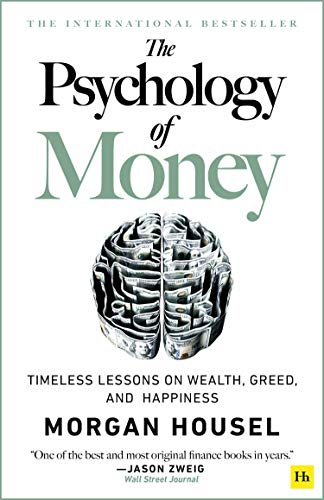The Psychology of Money
October 25, 2021

★★★★★
🚀 The Book in 3 Sentences
- Money and investing are emotional topics and therefore optimal allocation is really person-specific
- Every investor’s best friends are frugality, self-control and a long time horizon for compounding to work its miracles
- Dictating how you spend your time is the greatest thing that money can buy
Who Should Read It?
This is an amazing book that can help just about anybody. The lessons are presented in a very easy to follow manner with clear narratives. Even if not all advice in the book is applicable to you, I am willing to bet you will get value out of reading it.
☘️ How the Book Changed Me
How my life / behaviour / thoughts / ideas have changed as a result of reading the book.
- Accepting that financial planning is not 100% an optimisation game but has to account for the emotional component helped me improve my decision making
- Margin of safety is always in the back of my mind in any financial decision
✍️ My Top 3 Quotes
- More than I want big returns, I want to be financially unbreakable. And if I’m unbreakable I actually think I’ll get the biggest returns, because I’ll be able to stick around long enough for compounding to work wonders.
- The highest form of wealth is the ability to wake up every morning and say, “I can do whatever I want today.”
- You might think you want an expensive car, a fancy watch, and a huge house. But I’m telling you, you don’t. What you want is respect and admiration from other people, and you think having expensive stuff will bring it. It almost never does—especially from the people you want to respect and admire you.
📒 Summary - 1 sentence per chapter
Chapter 1: No One’s Crazy
Show me your personal experiences and I will be able to comprehend any investment choice you make
Chapter 2: Luck & Risk
Assessing probabilities in one-time events is impossible, therefore it is important to focus on sound general principles and not specific results
Chapter 3: Never Enough
Constantly wanting more is a disease caused by social comparison and subsequent envy
Chapter 4: Confounding Compounding
The magic ingredient to produce amazing results through compounding is time and not seeking the highest return
Chapter 5: Getting Wealthy vs. Staying Wealthy
Being fearful and avoiding ruin at all costs are the ways to maintain your wealth
Chapter 6: Tails, You Win
Failures are part of the investing game, what is important is that you keep playing
Chapter 7: Freedom
Money offers the freedom to dictate how you spend another limited resource: your time
Chapter 8: Man in the Car Paradox
Flaunting riches will not get you the respect and admiration you actually crave for
Chapter 9: Wealth Is What You Don’t See
Being wealthy does not leave traces for others to follow, in contrast to the misleading breadcrumbs that are created by spending money
Chapter 10: Save Money
The most important rate in becoming wealthy is your savings rate, as it only depends on you and your ability to not get influenced by what others think
Chapter 11: Reasonable > Rational
Personal finance is an emotional topic handled by emotional beings, so try to aim for peace of mind rather than maximising returns in financial decisions
Chapter 12: Surprise!
Groundbreaking world and economic changes cannot be predicted based on history or to phrase it in another way, past performance does not guarantee future returns
Chapter 13: Room for Error
Plan for a possible failure of your plans in order to allow yourself to stay in the game even in adverse conditions
Chapter 14: You’ll Change
Accept that you will change and try to minimise your future self’s regrets by avoiding extremely radical investment decisions
Chapter 15: Nothing’s Free
Market volatility is the price you pay for investment returns, embrace it or bad things happen
Chapter 16: You & Me
You and your investment horizon determine the correctness of your financial choices, not what others are doing
Chapter 17: The Seduction of Pessimism
Disasters happen overnight and lead to compelling pessimism spirals, while miracles take a long time before they get noticed
Chapter 18: When You’ll Believe Anything
We understand life through stories and not data, try not to be fooled by appealing and misleading ones
Chapter 19: All Together Now
Book summary chapter
Chapter 20: Confessions
How the author invests his money
- Posted on:
- October 25, 2021
- Length:
- 4 minute read, 739 words